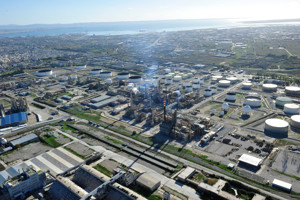Impact of strike by South Korean truckers on autos, steel, petrochemicals, others
(Reuters) - Thousands of South Korean truckers were on strike for the seventh day on Monday, protesting over pay as fuel costs surge, disrupting production, slowing port operations and posing new risks to a strained global supply chain.
South Korean industries, including auto, steel, petrochemical and cement, faced accumulated losses worth about 1.6 T won ($1.2 B) as of Sunday due to the ongoing trucker strike, the industry ministry said.
Following are details of the disruption, lost production and reactions from union officials and businesses.
AUTOS
The trucker strike had cost the South Korean auto industry about 5,400 vehicles in lost production, worth about 257 B won as of Sunday, according to the industry ministry.
Hyundai's Ulsan factories makes about 6,000 vehicles daily, the union said. The strike had cost the automaker more than 3,800 vehicles as of Friday - worth up to 120 B won, according to the company's union.
Some employees at Hyundai Motor and affiliate Kia Corp were using newly assembled cars to make deliveries, customers told Reuters. Hyundai Motor Group's spokesperson was not immediately available for comment.
Hankook Tire & Technology Co Ltd, supplier to major automakers such as Volkswagen AG and Mercedes-Benz Group AG, has seen daily shipments fall by about 50%, a spokesperson said.
The industry ministry estimated that about 640,000 tires worth about 57 B won had faced shipping issues as of Sunday.
SEMICONDUCTORS
The truckers plan to stop shipments of raw materials for semiconductors produced in Ulsan, said union official Park Jeong-tae.
Samsung Electronics Co Ltd and SK Hynix Inc , two of the world's biggest memory chip makers, declined to comment.
One major tech manufacturer does not expect near-term disruptions given its inventories of raw materials, said an official at the manufacturer on condition of anonymity.
CEMENT, STEEL
Steelmaker POSCO said it halted work at some plants on Monday due to a lack of space to store unshipped products.
About 450,000 tons of steel products worth about 698 billion won have faced transport issues due to the strike.
The Korea Cement Association estimated daily revenue losses of about 15 B won for the cement industry since the strike began last Tuesday.
The industry ministry estimated that the strike had cost cement companies about 75 B won as of Sunday.
REFINERS, PETROCHEMICALS
S.Korea's average daily shipments of about 74,000 metric tons of petrochemical products have been slashed by 90% since the strike, the Korea Petrochemical Industry Association said.
The strike had cost the country's petrochemical sector about 500 billion won as of Friday, according to the industry ministry.
South Korea has the world's fifth-largest refining capacity.
PORTS AND CONTAINERS
Busan Port, the world's seventh-biggest container port, said the strike had cut its container traffic by two-thirds.
Container storage sites are filling up and authorities are discussing measures to secure more, a government official said.
The movement of containers at Ulsan port, which accounts for about 10% of South Korea's port traffic, has been suspended since Tuesday, a government official said.
($1 = 1,286.6200 won) (Reporting by Seoul bureau; Editing by Christopher Cushing and Stephen Coates)







Comments